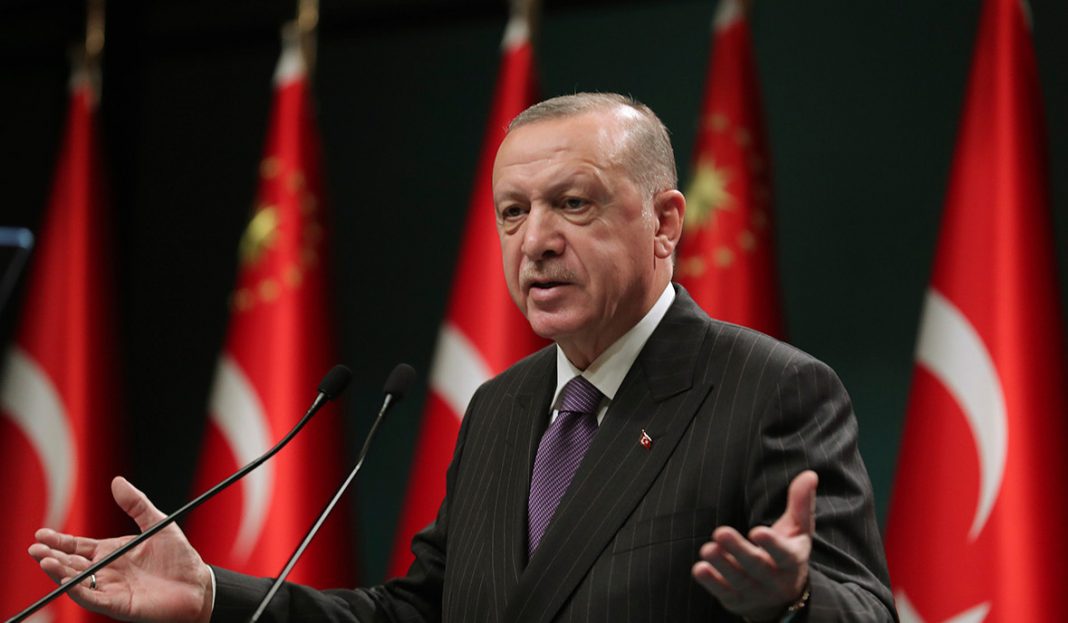50 years ago, the invasion of Cyprus by Turkish troops, on 20 July 1974, divided the island into Turkish and Greek parts. Ankara’s action was in turn provoked by a coup d’état in Cyprus by supporters of the island’s annexation to Greece. Since then, 20 July has been a day of mourning for Greek Cypriots and a day of liberation for Turkish Cypriots. In 1983, the Turkish Cypriots unilaterally declared the establishment of the Turkish Republic of Northern Cyprus. The self-proclaimed state is recognised only by Ankara. An attempt by Recep Tayyip Erdogan to persuade members of the “Turkic Council”, which includes Azerbaijan, Kazakhstan, Kyrgyzstan and Uzbekistan, to recognise the TRNC failed.
In this piece, Ascolta examines the Turkish president’s current foreign policy stance not only around the long-standing issue of determining the international recognition of Cyprus and resolving the frozen conflict between its Greek and Turkish parts, but also on a range of geopolitical areas that are in many ways defining for both West and East.
This Content Is Only For Subscribers
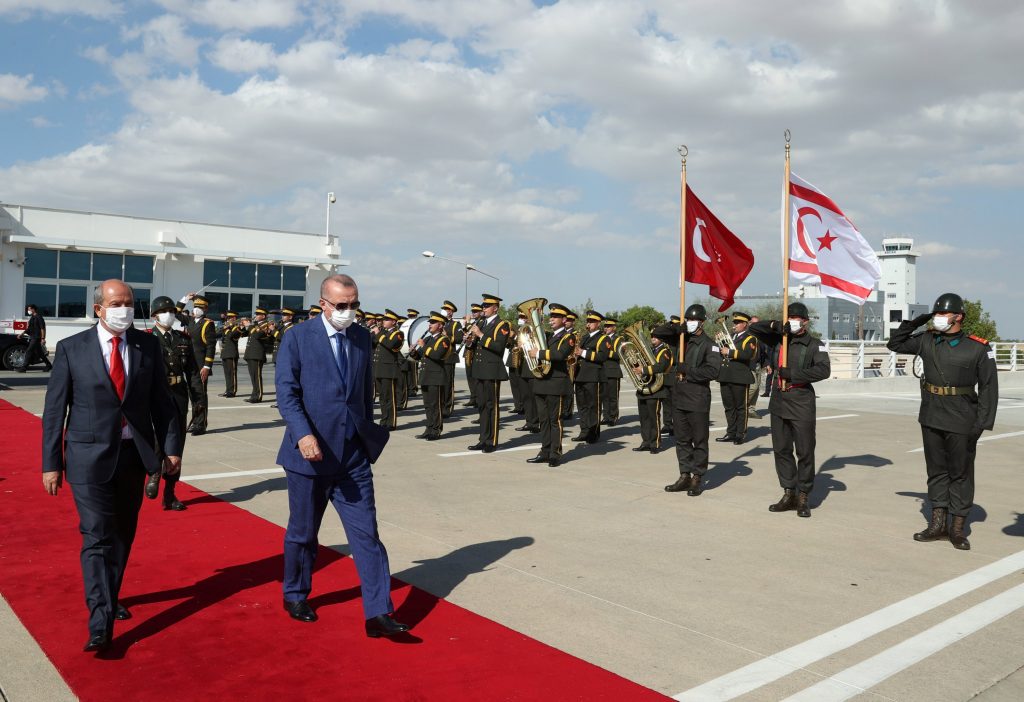
Arriving in the unrecognised Turkish Republic of Northern Cyprus on the occasion of the events of fifty years ago, Turkish President Recep Tayyip Erdogan once again delighted the world community with his epathetic statements that he supports the decision to form and recognise two states in Cyprus, believing that ignoring the realities on the island in the Eastern Mediterranean will lead “nowhere”. The Turkish leader ruled out the possibility of resuming negotiations on the basis of then UN Secretary General Kofi Annan’s plan, which proposed the creation of a United Republic of Cyprus on the basis of a two-state federation. Since Cyprus joined the European Union, Brussels considers the entire island as EU territory and Turkish Cypriots as EU citizens. European Commission chief Ursula von der Leyen also considers the Cyprus issue to be a European one and insists on a federal structure for the island.
Decades of UN-backed negotiations have failed to reunite the island. Greece and Greek Cypriots had hoped that Erdogan would soften his stance. But the latter remains adamant. “You cannot bathe in the same water twice. Ignoring the facts on the island will achieve nothing. We believe that a federal solution in Cyprus is impossible,” Erdogan said and added: “we do not see the possibility of starting a new negotiation process in Cyprus without establishing equality where both sides sit at the negotiating table as equals.”
In addition, the Turkish president accused Greek Cypriots of intending to build a naval base on the island’s southeastern coast and said Turkey would not give up building its naval bases in Northern Cyprus if necessary. Erdogan’s remarks further complicate efforts by UN Secretary General António Guterres to bring both sides back to the negotiating table, which, incidentally, were last held in 2017.
Erdogan’s foreign policy escapades have long provoked mixed reactions in the West, the Global South, and within Turkey itself. His recent accusations against the administration of now-defunct US presidential candidate Joe Biden of complicity in atrocities during Israel’s military operation in the Gaza Strip are among the harshest criticisms of the White House. Ankara’s proactive foreign policy has become Erdogan’s calling card and a means of diverting the attention of his own people from domestic problems. And the toughness of his speeches and provocative actions only create a perfect backdrop for this.
Actually, there is nothing new in Erdogan’s behaviour. It is enough to remember last year’s presidential elections. Clouds were gathering over the Turkish economy. It was plagued by inflation, which had reached 86 per cent, mainly due to the strange monetary policy of keeping interest rates low as a way of reducing consumer prices. February’s earthquakes, which left an area the size of Bulgaria in ruins, exposed negligence in construction, corruption and the authorities’ lack of disaster preparedness. The opposition rubbed its hands together in joy, anticipating the end of the Erdogan era. But he not only survived, but won, by not only fanning the flames of the culture wars, declaring the opposition a threat to Turkish culture and national security, but also by employing favourite foreign policy schemes that reinforced his position among voters as the “saviour of the nation from external threats”. At that time, his army was proactive in Syria and bombing Kurds in northern Iraq, Turkish drones were fighting in Libya, and relations with Greece could escalate into military conflict at any moment.
Today’s situation resembles last year’s in many ways, but only with nuances. Internally, Erdogan’s situation is complicated not only by economic problems, but also by the failure of his Justice and Development Party (AKP) in the municipal elections, which Turkey views as a prologue to the 2028 presidential campaign. Let us try to analyse the impact of domestic factors on Turkey’s foreign policy and at the same time understand whether the Turkish leader has lost his way in the labyrinths of the foreign policy he has created.
Municipal elections on a non-municipal scale
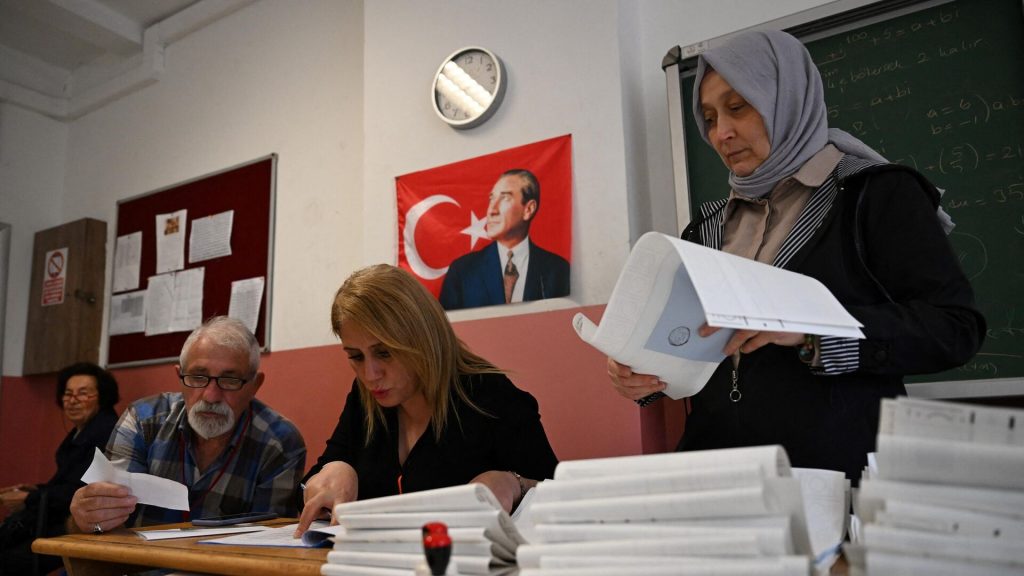
On the eve of the 31 March municipal elections in Turkey, many experts and analysts were wondering how they would affect the 2028 presidential campaign. It should be noted that the ruling Justice and Development Party’s position was badly shaken back in 2019, when the united opposition won in five of the country’s six largest cities: Istanbul, Ankara, Izmir, Antalya and Adana. Only Bursa was the exception. The Turkish authorities therefore wanted revenge in order to strengthen their position and eliminate any threat from the opposition in the 2028 elections.
The 31 March elections were also important because President Erdoğan unexpectedly announced in mid-March that the current campaign, in which he had been actively involved, supporting the candidates in every possible way, was his last. “I have been working non-stop, and this is my final,” the 71-year-old politician said, signalling for the first time that he would not run again for the post of head of state. The Turkish leader added that the 31 March elections “will be a blessing for the brothers who will come” after him. That is, the vote may yet reveal potential successors to the post of head of state.
However, most analysts were not inclined to believe Mr Erdogan. As the Turkish opposition channel NTV noted at the time, if the incumbent succeeded in regaining control of Istanbul and Ankara, it could ultimately change the balance of power at the national level, split the opposition and bring additional votes to the Turkish parliament. The whole trick was that by bringing the number of his supporters in parliament to 360 votes, he would gain a constitutional majority that would give him a chance to further change the constitution. In particular, to repeal Article 101 – that a politician is not allowed to hold the office of president for more than two consecutive five-year terms. Another purely hypothetical option is to announce early presidential elections. In such a case, as Article 116 of the Constitution states, the incumbent head of state has the right to run again. But again there is the issue of constitutional majority, for which Erdogan lacks 47 votes.
After the 2017 referendum, Turkey switched from a parliamentary form of government to a presidential one and Erdogan was given powers that are called super-presidential. He has the power to issue decrees that have the force of law. If parliament passes a law on the same topic as the president, the parliamentary law is cancelled. Erdogan himself appoints the vice presidents. He is not accountable to the country’s parliament.
Erdogan’s first and probably main goal in these municipal elections was to take Istanbul and remove its mayor, Ekrem Imamoglu, from the political scene.
The ruling party took into account the mistakes of the previous elections and put up a young and ambitious candidate against the incumbent mayor: 47-year-old Murat Kurum, former minister of urbanisation and environment. He gained a lot of political weight during the earthquake relief operation of 6 February 2023. The former minister’s name is associated with TOKI, a state-owned company that builds social housing across the country. None of the houses built by TOKI collapsed during the earthquake – reinforcing the state company’s credibility. Many residents of eastern Turkey are looking for flats in houses built by this contractor. It is also important that Murat Kurum supervised the campaign to provide social housing for the poor citizens of Turkey. In addition, as Minister of Environment, he was responsible for the elimination of the consequences of forest fires in Manavgat and Marmaris in August 2021 and floods in Kastamonu in June 2022.
The topic of earthquake relief has become one of the key topics in the ruling party’s election campaign. The government-controlled media actively criticised Ekrem Imamoglu for his unfulfilled promises to rebuild Istanbul’s housing stock to make the city more earthquake-proof.
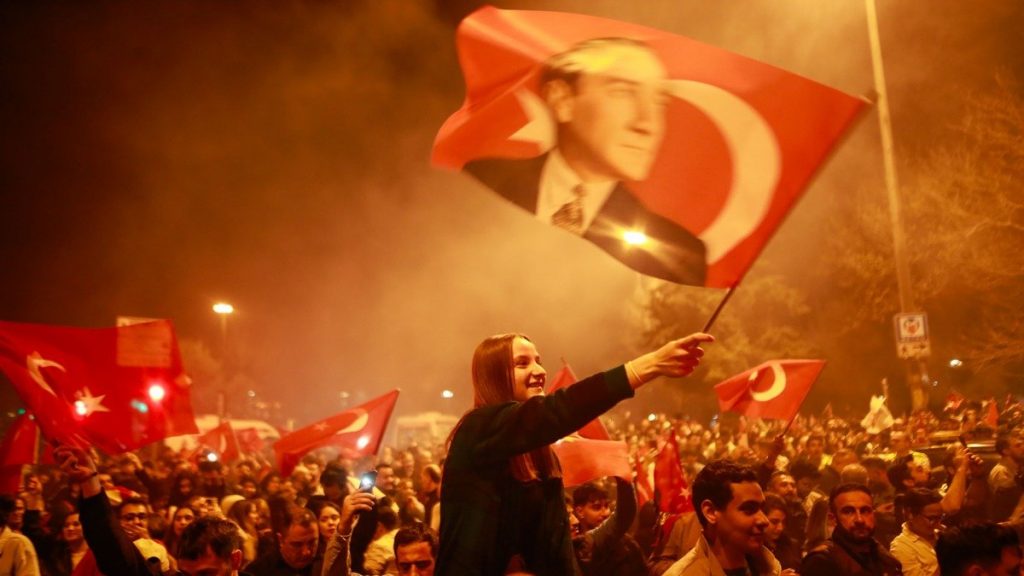
Meanwhile, Imamoglu himself emphasised large-scale infrastructure projects in his campaign. “We have built more than 65 kilometres of metro in five years, more than half of the 122 kilometres of lines built in the last 25 years. We have done more work in five years than they (ruling party representatives) have done in 25 years, they are crazy about it,” the politician emphasised. Mr Imamoglu also criticised the Turkish authorities for neglecting the situation of the poor and pensioners. “They have no money for the needs of pensioners, but as soon as they need to build a new canal in Istanbul, they find the money,” the mayor said, referring to an ambitious project to build a canal alternative to the Bosporus Strait. Despite the fact that sociological forecasts said the candidates had roughly equal chances, the election ended in a triumph for Imamoglu, who retained his position as Istanbul mayor with 51.14% of the vote, while the ruling party candidate Murat Kurum won 39.59%. The victory in Istanbul not only reinforced Ekrem Imamoglu’s status as the leader of the entire Turkish opposition. According to the results of the voting, the 52-year-old mayor Imamoglu has turned into the most powerful rival of President Erdogan and has every chance to oust him or his successor from the presidency in the 2028 elections.
In addition, the opposition Republican People’s Party was also successful in the elections, winning a majority in 36 of Turkey’s 81 provinces, while President Erdogan’s associates won in only 24. The opposition retained control of the largest cities, notably Istanbul, Ankara, Izmir and added Bursa. The ruling AKP has finally turned into the party of the villagers. “These were the first local elections of the second century. I promise you, in the first national elections of the second century, we will bring Ataturk’s party to power,” commented Özgür Özel, the chairman of the AKP. He meant that the party was founded 101 years ago – it was established in 1923 by Mustafa Kemal Ataturk, the founding father of the modern Turkish Republic. The national elections that Özel referred to are scheduled for 2028, which will be both presidential and parliamentary elections.
The electoral debacle infuriated Erdogan. The next day, he convened an emergency meeting of the ruling party’s presidium to discuss the reasons for the failure. The election results for the government were not comforting and were not because the opposition presented the people with a full-scale economic programme or any alternative. No. People supported the opposition as a sign of protest against the current course in the economy. The government lost millions of votes of pensioners dissatisfied with low pensions.
The minimum state pension in the country is about 10,000 lira ($308.39), while the minimum wage is 17,000 lira ($524.26), inflation jumped to 68 per cent in February, a record for the past year and a half. At the same time, the cost of public utilities jumped 1.5 times for Turks, transport – 1.8 times. Food products in Turkey in March rose in price 1.7 times, clothes and footwear – 1.5 times. Having left the government to clear the rubble in the economy, Recep Tayyip Erdogan has once again got on his foreign policy horse and “rode” to distract the people from economic problems and electoral disappointments.
The capricious child of the West
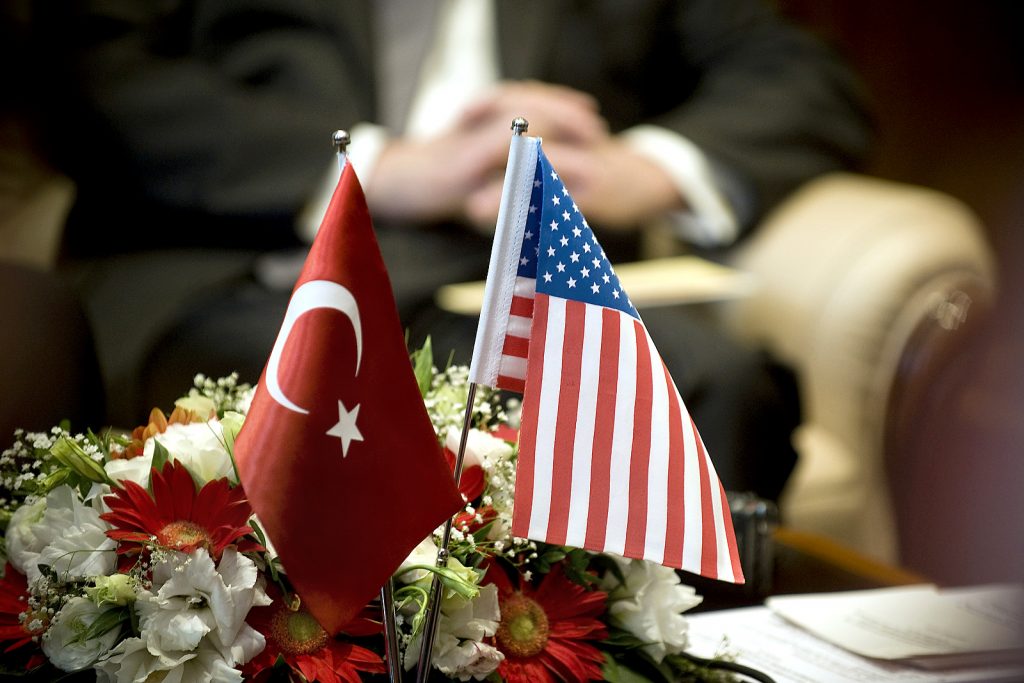
Erdogan never misses an opportunity to declare that in international affairs he is guided solely by the country’s national interests. This position leads to constant complications in relations with Washington – mini-crises in Turkish-American relations occur with enviable regularity once every two or three years. On the other hand, Turkey is one of the leading members of NATO, the main bastion of the alliance’s southern flank, deeply integrated into the bloc’s military and political infrastructure. Therefore, “disobedience holidays” will invariably be replaced by demonstrations of loyalty to transatlantic unity. And while Ankara, for example, has not formally joined the US anti-Russian sanctions, Turkish business is forced to follow these restrictions to a greater or lesser extent.
After the 2023 presidential elections, many experts believed that Ankara’s foreign policy pendulum would swing to the West. First of all, because of the difficult economic situation. In fact, the first signs of this have begun to be seen.
Erdogan began to call more often on Brussels to resume negotiations on accession to the European Union. Ankara stopped blocking Sweden’s bid to join NATO, after which the US withdrew its objections to the supply of modernised F-16 fighter jets – in February, the US Congress gave the green light for their export to Turkey. Thus, Ankara has finally abandoned the idea of buying Su-35 and Su-57 fighters from Moscow as an alternative to the F-16, although Turkish officials have repeatedly raised the possibility of such an option in recent years. Moreover, Turkey and the United States have intensified talks on Ankara’s return to the F-35 fighter programme on the condition that the Turkish side gives up Russian S-400 anti-aircraft missile systems.
New breakthrough agreements were expected from Erdogan’s visit to Washington. However, for unclear reasons it was postponed indefinitely. The Turkish Foreign Ministry used a streamlined formulation that “high-level dialogue” to prepare for the visit would continue. Instead of a visit and meeting with US President Joe Biden, he accused him and the White House of complicity in atrocities during Israel’s military operation in the Gaza Strip and lashed out at the United States and other NATO allies who he said were “fuelling the fire” of the conflict in Ukraine.
Erdogan explained that he has fundamental disagreements with Biden and the White House on a range of issues. “We have different views on human rights. We believe that Israel’s brutal killing of innocent people in hospitals where they go for treatment, in ambulances, in markets, in humanitarian aid distribution centres and in areas defined as safe is a gross violation of human rights,” the Turkish president said. “However, the US administration ignores these violations and gives Israel maximum support. They do so at the expense of complicity in these violations,” he added.
At the NATO summit in July this year, Erdogan once again eupatised his alliance partners, saying, “As a member of NATO, we do not consider it a problem to interact with the SCO, BRICS, the European Union or the Organisation of Turkic States,” the Turkish leader said, stressing that Ankara’s cooperation with the above-mentioned associations “contributes to world peace”. Thus, Erdogan once again demonstrated that Turkey’s policy of balancing between different powers and interstate alliances remains its foreign policy priority. The Turkish leader has once again demonstrated that he does not stick to any foreign policy course, he is looking for opportunities to strengthen Turkey in foreign policy and economy. He is like a merchant who trades where it is profitable, using Turkey’s main advantage – its geographical position at the junction of Europe and Asia.
In NATO, they say Turkey is the enfant terrible. Having the second largest army in NATO, Ankara behaves very separately within the organisation. Turkey’s alienation from NATO reached its climax in 2017 when the country bought S-400 air defence systems from Russia, against the stated will of NATO members, especially the US. In response, the US pulled Ankara out of a programme to deliver F-35 fighter jets for which Turkey had already paid, an unprecedented move among allies. After Russia’s full-scale invasion of Ukraine, Turkey’s president not only spoke out against sanctions against Russia, but actively tried to circumvent them. Finally, for various reasons, Turkey has long resisted Finland’s and Sweden’s entry into the North Atlantic Alliance. To this we can add that Turkey’s discontent with the West has other sources. These include Washington’s support for the Syrian Kurds and Turkey’s disputes with the EU over the conflict in the Eastern Mediterranean – two major issues. The West, for its part, disagrees with Turkey’s military operations in Syria, its drilling activities in disputed waters and its military positioning in the Eastern Mediterranean.
After years of stagnant relations with Turkey, the EU seems to have wanted to breathe new life into them. It did not want to do so suddenly, but was concerned that Ankara’s too long marination in the Brussels anteroom awaiting admission to the EU could have a detrimental effect on the prospects for a stable situation in the Eastern Mediterranean, and on European unity in general. They have decided that new positive incentives are needed. Especially since Turkey is an important NATO ally, and Brussels would like to keep it in a friendly tone.
And so, following the European Council meeting on 17-18 April, where the “strategic debate on EU-Turkey relations” took place, a signal was sent: the EU heads of state and government declared their interest in developing “cooperation and mutually beneficial relations” with Turkey and invited it to “constructive participation” in promoting this agenda. The emphasis on “constructiveness” was not accidental, as relations between Brussels and Ankara have remained, for many years, very difficult.
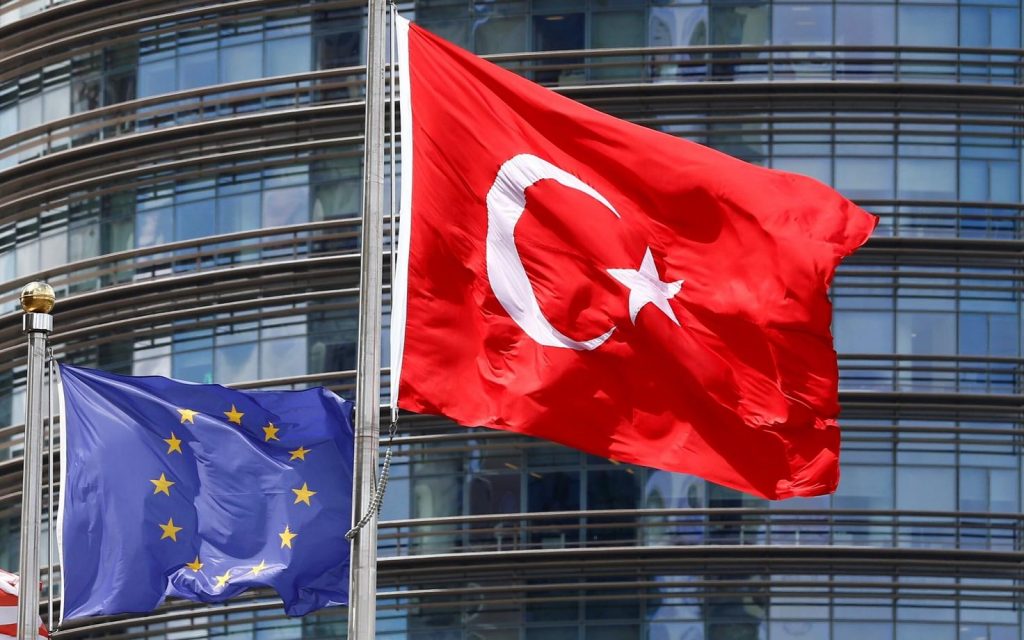
Although Turkey is an EU candidate country and an important strategic partner of the EU not only in the economy, but also in areas such as migration, counter-terrorism, climate, health and a number of regional issues, its periphery in the “European family” has clearly been prolonged. Among the current candidate countries, Turkey has been trying to join the EU for the longest time. Let us recall that back in 1963, the EU (then the European Economic Community) and Turkey signed an association agreement, also known as the Ankara Agreement, which opened the way to economic and political integration. In 1999, Turkey was granted the status of an EU candidate country, but was only able to start accession negotiations with the EU in 2005. However, it remained “overboard” for many years. These negotiations in June 2018 finally reached an impasse.
And so another “round of hope” was announced. But this time, too, the talk about direct accession to the ranks of the EU countries is not yet going on. According to Brussels, the Turkish authorities still have no way to meet the standards of the common European understanding of such fundamental essences as democracy, independent justice, the rule of law and basic human rights. It is no secret that President Recep Tayyip Erdogan is constantly accused in Europe of authoritarian policies, suppression of opposition, freedom of press and conflict with Turkish civil society, which, in the opinion of European leaders and members of the European Parliament, is in no way compatible with EU membership. And of course they have not forgotten the unprecedented pressure Erdogan exerted at the NATO summit in 2023, when he tried to link his agreement to ratify Sweden’s admission to the Alliance with Brussels’ readiness to resume open negotiations on EU membership. In politics, such things are usually not without consequences. In addition, the Cyprus issue remains a long-standing stumbling block.
The reputation of Erdogan and his regime in the eyes of Brussels has not improved since his re-election to the presidency in 2023 and the recent Turkish local elections in early April. Moreover, following his re-election, Manfred Weber, leader of the leading European People’s Party (EP) in the European Parliament (EP), favoured halting Turkey’s EU accession process. “We should postpone this process because it blocks better relations more than it supports them,” Weber said. He then argued in favour of a “general restart of EU-Turkey relations on a realistic basis” in favour of a close partnership rather than inviting Ankara to join the community. Notably, Weber’s view appeared to be shared by many EP factions.
Both in Strasbourg and Brussels are trying to find alternatives to what relations with Turkey might look like in the future. The EU is now Turkey’s largest trading partner and Turkey is the EU’s seventh largest trading partner. In 2022, trade between them totalled €198.1 billion, representing 3.6 per cent of the EU’s total foreign trade. In addition, Turkey, as a candidate country, receives financial support from the EU under the Instrument for Pre-Accession Assistance (IPA) and the European Sustainable Development Fund Plus. The amounts received under these programmes amount to billions of euros. As we can see, things are much more optimistic in the economic field than in political integration.
What has changed in the views of European officials? The affirmative answer to this question is certainly not related to the reputation of Erdogan and his regime. Europe is so concerned about the disturbing geopolitical processes in and around the continent that it has come to the conclusion that it is “time to gather stones”. This is more important. The war in Ukraine and Transcaucasia, Israel’s war with Hamas and the threat of its escalation involving Iran, the hot situation in Syria, Libya and Sudan and the incessant flows of refugees into Europe – all this forces the EU leadership to work out a new security policy and expand the circle of its allies. And in this respect, Ankara today seems to need Brussels more than it needs Ankara.
But this partner, as the EU realises, is very complex and has an independent vision of what is happening in the world. The EU is trying to link the current rapprochement between the EU and Turkey to the resumption of negotiations on the Cyprus problem and “making progress on this issue”. The EU Commission also stressed that Turkey’s uncritical stance on Hamas contradicts the EU’s position, which regards the radical Palestinian organisation as a terrorist organisation. But knowing Erdogan’s long-standing position and Israel’s destructive actions in Gaza, it is unclear what “constructiveness” European diplomacy was counting on here.
Ankara expectedly reacted sharply and indignantly to such conditions of Brussels. The Turkish Foreign Ministry said on 18 April that “Turkey will in no way accept” an approach that links progress in the country’s relations with the EU to the Cyprus issue. As it emphasised, “the way of thinking that reduces the complex relations between Turkey and the EU to the Cyprus issue should be abandoned. However, Ankara reiterated that it is still interested in EU membership. “However, we reject the selective limitation of bilateral co-operation to certain areas. Our dialogue with the EU will be reciprocal and will depend on the pace, level and scope of the EU’s approach to Turkey in the coming period,” the Turkish Foreign Ministry said in a statement.
The continuation of cooperation between the EU and Turkey in the fight against illegal migration is considered exceptionally important in Brussels. It is worth recalling that in 2016, at the height of the migration crisis, the EU agreed with Erdogan that Turkey would host illegal migrants with no chance of asylum travelling to Europe along the southern route (mainly through the Aegean Sea to Greece and the Balkans). To support Turkey, the EU set up a €6 billion fund. Since then, Turkey has taken in some 4 million people from an unprecedented influx of migrants seeking refuge from Middle Eastern and African conflicts. But as time has shown, the agreement still didn’t work too effectively, and illegal migration to Europe has flourished. In 2020, due to the worsening situation in Syria, Turkey repeatedly opened its borders to Arab refugees seeking the Balkans. Now the EU is hoping to renew the agreement. A further €3 billion has been earmarked for the period from 2021 to 2023 to continue the mission. Visa liberalisation with the EU could be an attractive factor for Ankara. A dialogue on this topic was started back in 2013. Back then, there was even a roadmap with 72 benchmarks that Turkey should meet in order to achieve visa-free travel. But this process was not finalised and has also been frozen.
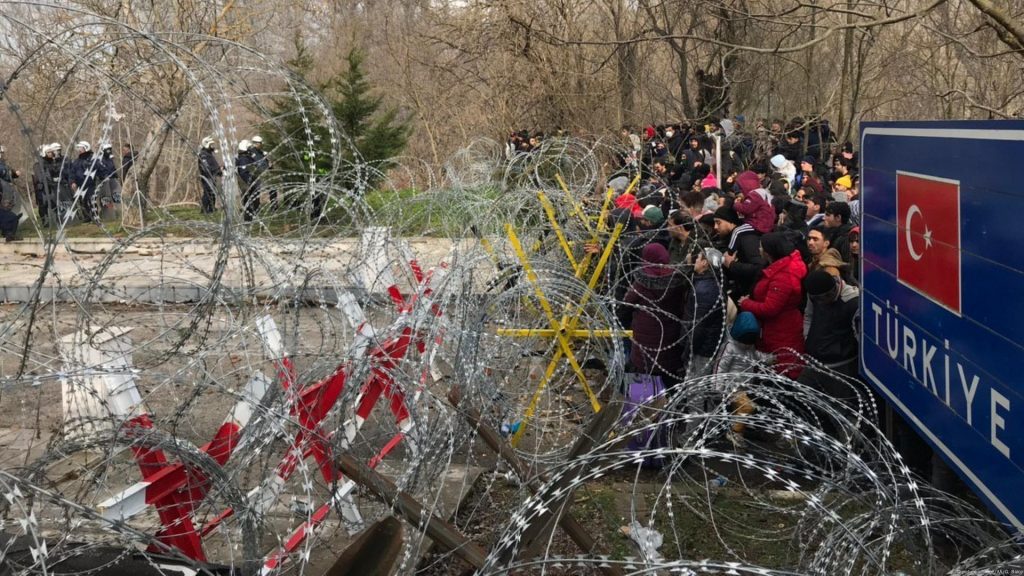
The main driver of the current European Council initiative on Turkey has been Berlin, which shows a high interest in maintaining ties with Ankara. Germany occupies a special place in Turkey’s relations with the EU as Ankara’s largest trade and economic partner in Europe, as well as the country where about 3 million Turks permanently reside. This is the largest national diaspora in the FRG, and it is larger than anywhere else outside Turkey. And among these Turks, 1.5 million have a German passport and have the right to vote. Ankara has always regarded this diaspora as its important foreign electoral reserve, because German Turks are mostly conservative and in all Turkish elections they traditionally show support for the ruling Justice and Development Party (AKP) and Erdogan personally. Erdogan himself has never hidden that Germany is the key to the door to the European Union.
Some experts believe that Ankara wants to bargain with the EU with statements about joining BRICS and SCO. This is a method of pressure and blackmail against the EU, saying that if you do not accept us in the EU, we will go to BRICS. It should be said that after many years of stagnation in relations with Turkey, the EU seems to want to breathe new life into them. It did not want to do so suddenly, but was concerned that Ankara’s too long marinating in the Brussels anteroom waiting for admission to the EU could have a detrimental effect on the prospects for a stable situation in the Eastern Mediterranean and on European unity in general. They have decided that new positive incentives are needed. Especially since Turkey is an important NATO ally, and Brussels would like to keep it in a friendly tone.
However, German-Turkish relations under Erdogan’s presidency have never been easy, especially in recent years against the backdrop of the migration crisis in Europe. His official visit to Berlin last November, initially expected as a possible step towards a reset of relations, turned out to be less than successful and revealed many contradictions between the two sides. Their dialogue was neither a landmark nor a breakthrough. Moreover, it coincided with the events of the Israeli operation in the Gaza Strip and was overshadowed by Erdogan’s harsh political statements in support of Hamas and critical attacks against Israel as a “terrorist state,” which the FRG considered unacceptable.
Nevertheless, Erdogan was then given an honourable meeting in Berlin in accordance with the norms of grand protocol and in addition to talks with German Chancellor Olaf Scholz, he was received at his Bellevue residence by German President Frank-Walter Steinmeier. Steinmeier did not start his return visit to Turkey from the capital, but from Istanbul, where he met with representatives of civil society and the recently won mayor of the city Ekrem Imamoglu, Erdogan’s biggest domestic political opponent, in municipal elections. The media saw in this fact a certain sign: “Steinmeier arrived just a few weeks after local elections in Turkey, the significance of which went beyond local elections” and in which “voters taught President Erdogan a lesson”: for the first time in its history, his Islamic conservative AKP was no longer the biggest force in the country, while the country’s largest opposition force, the People’s Republican Party, won in many important cities.
With his first meeting with Imamoglu, Steinmeier is, he says, sending a signal that Berlin is already looking at a post-Erdogan period. After the unexpected defeat of the ruling AKP party, the opposition politician has become the hope of Erdogan’s opponents more than ever. Steinmeier has criticised the Turkish president over respect for human rights, and democratic freedoms, the crackdown on opposition journalists. There were other unpleasant topics, the main one being the complete divergence of views between the sides on Israel and Hamas’ war in the Gaza Strip. Erdogan demonstrated that he has not changed one iota from his position expressed in Berlin in November. He still views Hamas as a liberation organisation. Moreover, just before Steinmeier’s arrival at the weekend, the Turkish president received Hamas foreign policy chief Ismail Haniyeh, which almost all experts regarded as a demonstrative challenge to the Germans.
The visit of the German president once again showed that Ankara’s economic rapprochement with Berlin, and subsequently with the entire European Union, still has much more prospects than political. In the latter case, real integration is obviously far away. In general, instead of Turkey’s full membership in the EU in the foreseeable future, we can only talk about a model of privileged partnership. And Ankara is well aware of this. They still do not see the need to bind their freedom of action to the conditions and rules of the European Union, although they are not averse to taking advantage of the benefits of cooperation with it and are not giving up their European choice. Ankara is increasingly confident that it is in high demand from Brussels as a special kind of crisis manager – be it refugee flows, the war in Gaza or Ukraine. And it seems such a role could suit President Erdogan and boost Turkey’s self-esteem.
Regional leadership

There is no doubt that Recep Tayyip Erdogan has managed to become an important regional player, capable of causing some crises and resolving others. Of course, leadership implies ensuring regional stability in the key regions for the leader, in Turkey’s case in the Eastern Mediterranean, Black Sea and Middle East regions. But current national interests, as understood by the Turkish leadership, often push Ankara to play for aggravation. Let us recall at least the agreement between Turkey and Libya (represented by the Government of National Accord) on the delineation of jurisdictional zones in the Mediterranean Sea, signed at the end of 2019 and which caused such a strong negative reaction from all neighbouring countries. The Turkish military presence in Syria is also far from being perceived by all as a factor in strengthening stability in the region.
An important area of Erdogan’s foreign policy is the Middle East. Ankara’s traditional pro-Palestinian line fits into the logic of its desire to preserve and increase its political image assets. It is important for Recep Erdogan and his supporters in the Justice and Development Party (AKP) to demonstrate their commitment to the “Palestinian cause” in order to strengthen their position inside the country and restore the electorate’s trust, which, as the results of the municipal elections held in March this year showed, was significantly undermined, among other things, due to the opposition’s successful campaign to highlight Turkey’s ongoing trade contacts with Israel.
This largely explains the aggressive and aggressive rhetoric of the Turkish president addressed to the state of Israel and Benjamin Netanyahu personally, as well as the temporary (“until the end of hostilities in Gaza and the creation of conditions for the unimpeded delivery of humanitarian aid” to the Palestinian enclave) ban imposed by the Turkish Ministry of Trade in early April this year on the export of 54 categories of industrial goods to Israel, and the suspension of civil flights to Israeli cities by Turkish Airlines. At the same time, given the existence of certain developments in the trade sphere, the economic and financial interest of the Turkish ruling elite in relations with Israel remains. For example, Azerbaijani oil, which satisfies 60 per cent of Israeli consumption, continues to flow to Israel through the Turkish port of Ceyhan.
Despite the new trade restrictions, the Turkish government to this day refrains from directly mentioning car exports (in the last two decades Turkey has established itself as one of the largest suppliers of this type of products to Israel). At the same time, some analysts believe that a number of car factories in Turkey are owned by businessmen allegedly linked to the government, indicating the ruling elite’s personal interest in continuing such contacts. Another motive behind Turkish behaviour in the multifarious Middle East events is the desire to play the role of a mediator in the Palestinian-Israeli conflict. In this regard, Recep Erdogan wants to strengthen his position inside the country, as well as to establish himself as an active participant in the international negotiation process. On the whole, at this stage it looks like the Middle East chessboard opens up a complex of multivariate moves for Turkey. To a certain extent Ankara manages to manoeuvre and move forward, but time will tell how durable this strategy will be.
As for Iran, the two countries have complex relations. They are both partners and adversaries on various issues. Iran has been waging a hybrid war against Israel for a long time, and Turkey also has tense relations with the Jewish state. It is Tehran that is trying to pressure Ankara to toughen its position on Israel and cut off all trade channels with it. But on Syria, the countries have completely different positions. Iran supports the Assad government, while Turkey provides assistance to the armed opposition. And at the same time Turkey does not support sanctions against Iran. Tehran and Ankara share similar views on the Kurdish problem – neither of them wants to create a Kurdish autonomy in post-war Syria and an independent Kurdish state in Iraq. The special relationship between Turkey and Iran is evidenced by the fact that Tehran informed Ankara in advance of the planned operation against Israel, which eventually took place on the night of 14 April. After the election of Masoud Pezeshkian, who is Azerbaijani and Kurdish by roots, as president of Iran, Recep Erdogan hopes to significantly advance relations with Iran and give them a special status.
Another important country in the Persian Gulf is Saudi Arabia. Their relations with Turkey have been going from bad to worse for a long time. In tandem with the UAE, they even tried to isolate Turkey in the Middle East, but Ankara successfully resisted these moves. Then there were preconditions for rapprochement between the two sides. First, the Saudis began to restore relations with Turkey’s main ally in the region – Qatar. And after Donald Trump lost the presidential election, the alliance with the U.S. broke up because Joe Biden, known for criticising both Saudi Arabia and Turkey, began to establish relations with Iran. In this situation, a new alliance – Ankara – Er Riyadh – emerged. So Erdogan intended to pragmatically improve his economic affairs at the expense of investments from Saudi Arabia, counting on 50 billion dollars. And while Israel’s operations in Gaza have stalled movement towards renewed diplomatic relations between the two countries, it has not stopped engagement on a wide range of issues, from intelligence sharing to major investment projects.
Despite historical rivalries in the Caucasus between Turkey, Iran and Russia, Ankara has managed to establish itself as a key regional player in the South Caucasus. The assistance provided to Azerbaijan to solve the Karabakh problem allowed Turkey not only to legitimise its military and political presence in Azerbaijan, but also to gain a controlling stake in the sphere of influence on Azerbaijani society. Turkey is building deep relations with another South Caucasus country, Georgia.
According to the results of 2023, Turkey became Georgia’s main trade partner. The trade turnover between the countries totalled $1.4 billion. The only country that does not have good relations with Turkey is Armenia. Although Turkey recognised Armenia’s independence in 1991, the countries have not yet established diplomatic relations. Turkey blocks the land border: road and railway transport does not run, and goods between the countries transit through Georgia. One of the reasons for the prolonged disputes is the Nagorno-Karabakh conflict, in which Turkey unequivocally supported Azerbaijan.
During the second Karabakh war, Ankara supplied arms and ammunition to its ally, Turkish instructors helped Azerbaijani commanders plan operations, and Turkish mercenaries fought on Baku’s side. Another reason is the debate over the genocide of Armenians in the Ottoman Empire during the First World War. According to various estimates, up to 1.5 million people died as a result of deportation and extermination between 1915 and 1918. More recently, Recep Erdogan declared that a new order is being established in the South Caucasus and urged Armenian Prime Minister Nikol Pashinyan to put aside groundless memories and focus, as Erdogan put it, on creating the beginnings of a “new era.”
It is worth noting that certain progress on this path took place back in January 2022, when the first meeting of special representatives on the process of normalisation of relations between the two countries took place. Turkey’s Special Representative Serdar Kılıç and Armenian Parliament Vice Speaker Ruben Rubinyan agreed to continue negotiations for the normalisation of relations. And in February 2023, Armenian Foreign Minister Ararat Mirzoyan spoke about the possibility of opening the Armenian-Turkish border.
“Middle State” or why Turkey needs BRICS, SCO and other associations?
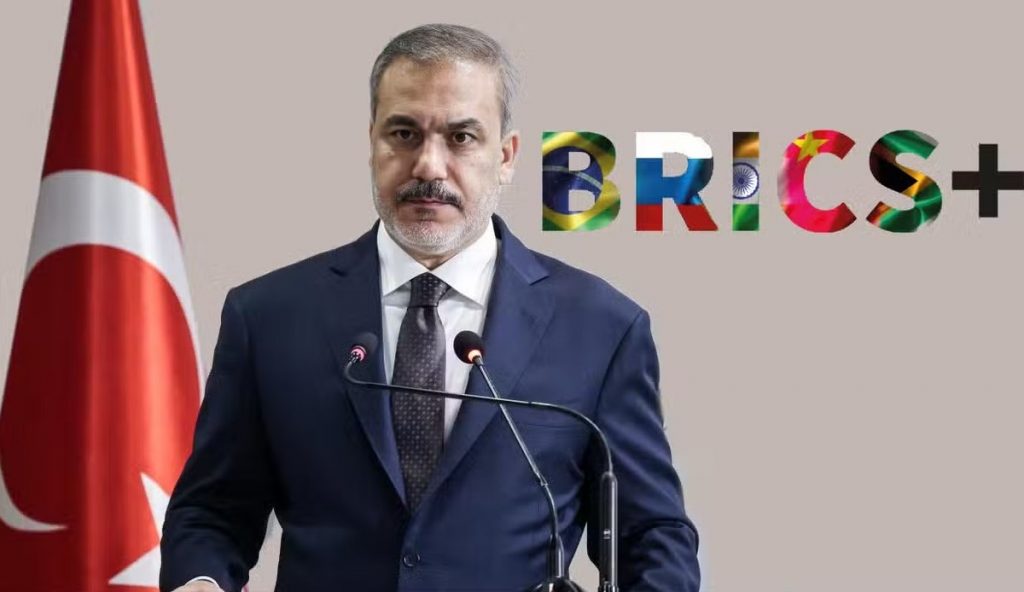
Erdogan is not limiting himself to the regional agenda, he is already talking about the restructuring of the international system and global trends. The current stage of development of the system of international relations, the formation of new integration formats of interaction only contribute to the expansion of the range of Turkey’s diplomatic activity. Opposing different directions of Ankara’s foreign policy, attempts to fit the complex range of its international interests into the narrow framework of the choice between moving to the West or to the East are erroneous.
Ideologically, Turkey does not move along any of these vectors. It feels itself as a kind of “middle state” connecting East and West and having a wide arsenal of “local” strategies, which it activates as the situation becomes favourable in any direction. At the same time, from a military-political and economic point of view, Turkey gravitates towards the Western bloc due to the existence of certain legally binding agreements and elements of trade and financial dependence.
At the same time, the Turkish leadership, having set itself the strategic task of strengthening the global position of the republic, is trying to orient itself towards the trends set by the countries of the “non-Western” world and is trying to fit in as a trustworthy partner. In this context, the vagueness of the Turkish side’s formulations on the issue of joining BRICS and the fickleness of its statements on rapprochement with the EU become clear. There is no doubt that at certain moments Ankara uses the BRICS factor to strengthen its negotiating position in the dialogue with the West. At the same time, it should be understood that for Turkey these two directions of foreign policy are not mutually exclusive in principle, and it is deeply interested in the parallel development of each of them.
Thus, Turkish politicians’ statements about participation in the BRICS format are not a reflection of an ideological search for a “third way”, but a conscious part of Ankara’s goal to achieve relative autonomy in the foreign policy track. What does Turkey want from BRICS? A simple analysis shows that the BRICS are gradually increasing their share in Turkey’s overall trade turnover: of the nine member countries, four (Russia, China, Egypt and the UAE) are among Ankara’s top 20 partners in terms of exports, with two more countries – Iran and Saudi Arabia (which has not yet officially joined) – not far behind. In imports, Russia and China are also leading, with the UAE, India and Brazil (about 32 per cent of the total) slightly lower in the ranking.
In 2024, due to constant pressure from Washington, trade turnover with Russia is rapidly declining, while dependence remains – mainly at the expense of energy carriers, as well as products of the steel industry and agro-industrial complex. Western partners offer their alternatives, but they cannot fully meet the demand, which is growing against the backdrop of the increasing share of industry in the country’s GDP (-31.29% in 2022) and inflation, and they are much more expensive.
BRICS, with the inclusion of the UAE, Egypt, Iran and Ethiopia, has become a multidimensional association, each of the member countries is of particular interest to Ankara, not only imports and exports. Turkey’s relations with Egypt are just beginning to mend, the BRICS platform could facilitate further rapprochement. Ethiopia is a promising market for Turkish products. Exports have not yet reached the stated target of $1bn, but Addis Ababa is already a regular buyer of Turkish military products: in 2024 Ethiopia purchased several Bayraktar Akıncı combat drones; Bayraktar TB-2 UAVs were reportedly used in repelling rebel attacks on Ethiopian government troops during the Tigray war. At the same time, the volume of Turkish investments in this country is second only to that of China (over $2bn).
The United Arab Emirates not only extracts energy resources, but also actively invests in tourism and high technology. Once rivals have recently entered the path of peaceful coexistence, which has favourably affected the inflow of capital to Turkey. Attracting investment is a sensitive issue for the Turkish economy, which is dependent on foreign capital. Erdogan’s unpopular fiscal policy has led to a significant outflow of European finance. And although the dominant source of foreign capital in Turkey has traditionally been the EU countries, but with the shift of the economic pole further to the East, Ankara seeks to develop relations with new financial centres, in particular, with China.
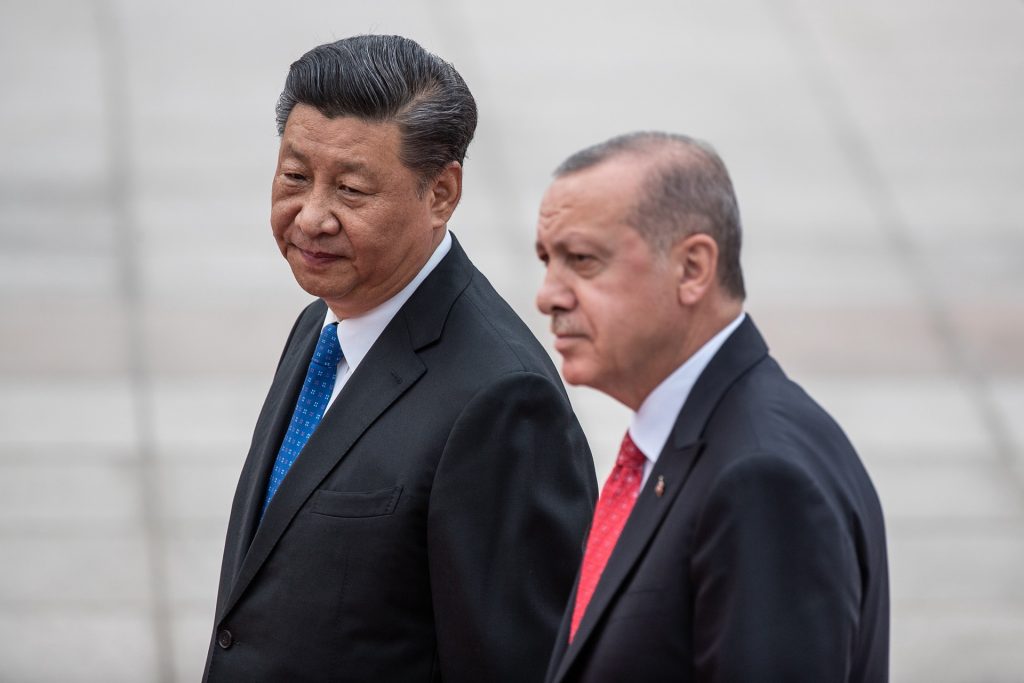
The results to date have been extremely modest: from 2013 to 2022, Beijing has allocated just 1.31 per cent of the total investment under the “One Belt, One Road” initiative. The achievement of Turkish diplomacy was the recent agreement with China’s BYD, under which the company will allocate $1bn to build an electric car factory. Meanwhile, Turkey still hopes to participate in Chinese projects as a contractor, especially in the Mediterranean, as well as to realise the full potential of the Trans-Caspian International Transport Corridor, which would require considerable financial (according to estimates by the European Bank for Reconstruction and Development – about $18.5 billion) and technological resources, which Ankara does not have. Unlike the European Union, BRICS is not a common market and is unlikely to become one. But what is certain is that the countries’ markets will become much more visible to each other, which could significantly expand Turkey’s export potential. Today Turkey may need BRICS in finance and technology, but what Ankara can give to the association is an open question.
In addition, as experts point out, Turkey’s regional and global geopolitical aspirations are an important driving force. In this regard, BRICS is seen as an additional international instrument that aligns with Turkey’s goal of establishing a “more stable and inclusive international order,” especially at a time when the legitimacy of the UN and other global institutions is increasingly being questioned. There is also a widespread argument among supporters of Turkey’s BRICS membership that a rapprochement with the integration grouping could help Ankara amid unstable relations with Western powers by providing support and a system of favourable existing ties within the prospective alliance.
In a recent speech, Erdogan said that Turkey “is not going to turn its back on the East for the sake of the West and neglect the West for the sake of the East,” thus sending a message to partners, both current and prospective. However, it can be assumed that the Turkish government will not force things too fast, as the negotiation process itself is extremely beneficial for Turkey, allowing it to realise its “multi-dimensional” political strategy.
Back in 2022, at the summit of the Shanghai Cooperation Organisation in Samarkand, Erdogan, in his own style, euphemised the international community by stating that Turkey wanted to become a member of the SCO, an organisation which in its charter has defined containment of NATO’s sphere of influence as one of its policy points. Two years later, at NATO’s anniversary summit, Erdogan again shocked his alliance partners by repeating his words: “Turkey’s goal, which now has observer status in the SCO, is full membership in the organisation. Now it should join the Shanghai Five.”
A curious detail. Responding to Erdogan’s statement about the prospects of full membership in the SCO, Putin’s spokesman Dmitry Peskov said: there are “certain contradictions related to the obligations and to Turkey’s position as a NATO member and the worldview that is enshrined in the fundamental documents of the Shanghai Cooperation Organisation.” Perhaps Erdogan has been made to realise that it will not be possible to sit on two chairs. Or perhaps it is a game where Russia clearly delineates its territory on the SCO platform and makes Erdogan realise it.
On the margins of the SCO summit, Recep Tayyip Erdogan had a number of important contacts at the highest level: he had a rather detailed conversation with Chinese President Xi Jinping, agreements in the field of security in a trilateral format with the heads of Azerbaijan and Pakistan, held talks with the leaders of Mongolia, Belarus and Qatar. All this seems to confirm the fact that Ankara sees the SCO as an important regional platform for outlining its initiatives and strengthening dialogue with non-Western countries, where the Turkish voice can be heard.
But finally, it was at the SCO summit in Astana that Erdogan had a meeting with Russian President Vladimir Putin. They have not met since the commanders of the Azov battalion returned to Ukraine with the help of the Turkish president, who were supposed to be on the territory of the latter until the end of hostilities, as agreed by Russia, Ukraine and Turkey. This is most likely the reason why Putin is avoiding visits to Erdogan. From the preparatory work that Turkey has done, it was obvious that the Turkish president was preparing for this meeting seriously, trying to “soften” Putin’s heart with his initiatives. These include Turkey’s announcement of its interest in BRICS, the initiative to create the SCO energy network with Turkish participation, Ankara’s indicated readiness to establish diplomatic relations with Damascus, Turkish politicians’ statements about the counterproductiveness of holding the Summit in Switzerland on Ukraine without Russia’s participation, and others.
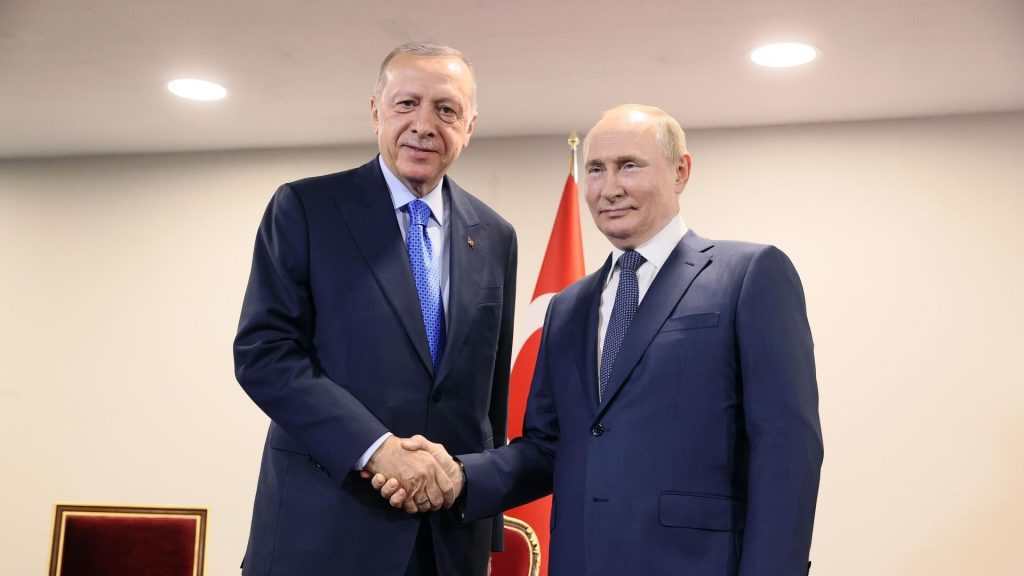
In the end, the talks between the two leaders in Astana did not result in any breakthrough decisions as such, as many initiatives are still shaded by disagreements and practical difficulties. Thus, in the Ukrainian case, despite the commitment of both capitals to the negotiation process, Turkey’s readiness to act as a “peacemaker” did not find agreement with the Russian side, which believes that “the Ukrainian conflict cannot be finalised through mediators”.
It is important to note that Turkey’s position on Ukraine has long been an irritant for the Kremlin. In June, on the margins of the St Petersburg International Economic Forum (SPIEF), Putin rebuked Ankara for its military aid to Kiev and resented the fact that the Turkish authorities are increasingly cooperating with Western financial institutions, from which they receive investments and loans. Turkey did not officially respond to Putin’s criticism, but Turkish Foreign Minister Hakan Fidan attended the event, which the Kremlin called nothing less than an “absurd gathering.” Ankara ended up being among the signatories of the summit’s final declaration – unlike, for example, India, South Africa or the UAE.
The cooling of bilateral relations is taking place not only on separate political tracks, but also in economic co-operation. On 1 January, Turkish banks stopped making money transfers from Russia due to the threat of US sanctions. This happened after US President Joe Biden issued a decree that foreign banks could lose access to the US financial system if they do business with the Russian defence industrial complex. Despite periodic assurances from Ankara and Moscow that the problem is being addressed, there has been no change. As a consequence, the volume of Russian-Turkish trade has been steadily declining. In February, Turkish exports to Russia fell by 33 per cent compared to the same month in 2023, and in April China overtook Russia as the key supplier of goods and services to the Turkish market. Moscow apparently expects more from Ankara on the construction of a gas hub, a megaproject needed to divert Russian gas exports because of the loss of direct access to most of the European market. The Turkish authorities never tire of assuring that the plans will soon be realised, but so far they remain only on paper.
Unlike the SCO, where Russia and China play first fiddle, the Summit of the Organisation of Turkic States (OTS), which took place in Shusha, according to some foreign observers, became another brick in the architecture of Turkey’s multilateral ties in Central Asia. Promoting the idea of multidimensional cooperation based on the principles of unity of Turkic culture, Ankara offers the countries of the region various formats of interaction involving the interplay of resources, capital, services, technology, etc. The event in July, where Turkey held its OSCE meeting in Shusha, was another brick in the architecture of Turkey’s multilateral ties in Central Asia. At this event in July, where Turkey was represented by Vice President J. Yilmaz and Foreign Minister H. Fidan, special attention was paid to infrastructure projects, transport and logistics. Against the backdrop of the May news of the establishment of a Turkic investment fund with an initial capital of half a billion dollars, decisions on the issues under discussion are likely not just to remain in the text of the final Karabakh declaration, but to become practical steps.
In this mix of alliances, it is very difficult to keep track of all of Turkey’s economic, military and cultural claims. Ankara knows very well from which forum it can benefit. The diversity of alliances allows the Turkish president to choose from the foreign policy menu those “dishes” that meet the current needs. This, as they say, is what Erdogan and his lacy foreign policy are all about.

